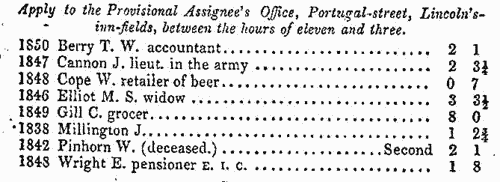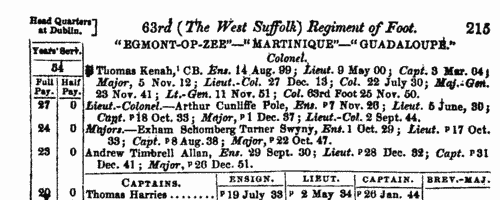Rising Surname Ancestry ResultsOur indexes 1000-1999 include entries for the spelling 'rising'. In the period you have requested, we have the following 110 records (displaying 71 to 80): Single Surname Subscription | | | Buying all 110 results of this search individually would cost £620.00. But you can have free access to all 110 records for a year, to view, to save and print, for £100. Save £520.00. More... |
These sample scans are from the original record. You will get scans of the full pages or articles where the surname you searched for has been found. Your web browser may prevent the sample windows from opening; in this case please change your browser settings to allow pop-up windows from this site. Bankrupts in England and Wales petitioning for discharge
(1851)
Perry's Bankrupt and Insolvent Gazette, issued monthly, included lists of bankruptcies and stages in the liquidation of the estate, payment of dividends, and discharge. Towards the end of the process there was a Meeting for Allowance of Certificates, where the bankrupt applied for a certificate of discharge. This meeting sometimes took place many years after the bankruptcy procedure started: the details given are the year originally gazetted, name (surname first), address, and trade; and the date and time of the hearing. This is the index to the names of the bankrupts, from the issues from January to December 1851.RISING. Cost: £6.00.  | Sample scan, click to enlarge

| Dividends of insolvents' estates in England and Wales
(1851)
Perry's Bankrupt and Insolvent Gazette, issued monthly, included brief notices of dividends of insolvents' estates. Each entry gives the year that the insolvency was first gazetted, the surname and initials of the bankrupt, trade and address; followed by the amount of the dividend as shillings and pence in the pound. This is the index to the names of the insolvents, from the issues from January to December 1851.RISING. Cost: £6.00.  | Sample scan, click to enlarge

| Traders and professionals in London
(1851)
The Post Office London Directory for 1851 includes this 'Commercial and Professional Directory', recording about 80,000 individuals. RISING. Cost: £4.00.  | Sample scan, click to enlarge

| British Army Officers
(1853)
The 14th volume of the New Annual Army List, for 1853, corrected to 30 December 1852, was published by Major H. G. Hart of the 49th Regiment. It contained 'the dates of commissions, and a statement of the war services and wounds of nearly every officer in the Army, Ordnance and Marines'. The first section, pages 1 to 111, lists officers of the rank of major and above in order of rank and precedence; officers with local rank (112-114); Yeomen of the Guard (115); the Honourable Corps of Gentlemen-at-Arms (116); Headquarters Staff (117); and then (as in the scan) all the regiments and units in order of precedence, giving any regimental honours, with all the officers by rank, and details of postings, facings and agents (118-336). A long section (337-426) then lists officers on the retired full pay and half-pay, including the Royal Regiment of Artillery, Corps of Royal Engineers, Royal Marines and military departments. Then there are lists of officers in the Commissariat Department, the Medical Department, Veterinary Surgeons and the Chaplains Department. A section of Officers on the Foreign Half-Pay gives lists for the German Legion and Miscellaneous Corps (Brunswick Cavalry, Brunswick Infantry, Chasseurs Britanniques, Royal Corsican Rangers, Dillon's Regiment, Greek Light Infantry, Royal Malta Regiment, Meuron's Regiment, Roll's Regiment, Sicilian Regiment, Watteville's Regiment, York Light Infantry Volunteers, the Foreign Veteran Battalion, and the Foreign Corps of Waggoners). After lists of officers in garrisons and military establishments, there are sections listing officers holding Gold Decorations for their parts in various important actions and other British decorations, and those holding medals bestowed by foreign powers. RISING. Cost: £4.00.  | Sample scan, click to enlarge

| Dissolutions of Partnerships
(1856)
Trade partnerships dissolved, or the removal of one partner from a partnership of several traders, in England and Wales
RISING. Cost: £6.00.  | Sample scan, click to enlarge

| Gentry in London
(1856)
The Post Office London Directory for 1856 includes this 'Court Directory', listing alphabetically by surname and christian name the upper class residents of the capital with their postal addresses. 'In order to afford space for the addresses, the abbreviation "esq." for esquire has no longer been appended to each name in the Court Directory. It should be understood that such should be added to the name of every gentleman in the following pages to which no inconsistent addition is affixed.' Decorations, honours &c. are generally given. Some gentlemen appear who are also listed (as professional men, &c.) in the commercial section. Those with second residences in the provinces usually have the country address given as well.RISING. Cost: £4.00.  | Sample scan, click to enlarge

| Traders and professionals in London
(1856)
The Post Office London Directory for 1856 includes this 'Commercial and Professional Directory', recording over 100,000 individuals. RISING. Cost: £4.00.  | Sample scan, click to enlarge

|  Persons of standing recommending London police recruits
(1843-1857) Persons of standing recommending London police recruits
(1843-1857)
The Metropolitan Police Register of Joiners (MEPO 4/334) lists policemen joining the force 1 January 1843 to 1 April 1857 (warrant numbers 19893 to 35804). The register is alphabetical, in so far as the recruits are listed chronologically grouped under first letter of surname. It gives Date of Appointment, Name, Number of Warrant, Cause of Removal from Force (resigned, dismissed, promoted or died), and Date of Removal. Although the register was closed for new entrants at the end of 1842, the details of removals were always recorded, some being twenty or more years later. Those recruits not formerly in the police, the army, or some government department, were required to provide (normally) at least two letters of recommendation from persons of standing, and details of these are entered on the facing pages. Where a recruit was only recently arrived in the metropolis, the names and addresses of the recommenders can be invaluable for tracing where he came from. Those recruits not formerly in the police, the army, or some government department, were required to provide (normally) at least two letters of recommendation from persons of standing, and details of these are entered on the facing pages: the names in these are indexed here (the police recruits are indexed separately and not included here). Recruits transferred from other forces or rejoining the force did not normally need recommendations - in the latter case, former warrant numbers are given - but some recommendations are from police inspectors, even other constables. Recruits coming from the army sometimes have general military certificates of good conduct, but most often have a letter from their former commanding officer; recruits recommended by government departments (most often the Home Office) similarly have letters from the head of department. But the great majority of the names and addresses in these pages are of respectable citizens having some sort of personal acquaintance with the recruit. Where more than two recommendations were provided, the clerk would only record one or two, with the words 'and others'. Tradesmen are sometimes identified as such by their occupations; there are some gentry. Although the bulk of these names are from London and the home counties, a scattering are from further afield throughout Britain and Ireland. RISING. Cost: £8.00.  | Sample scan, click to enlarge

|  Sailors and marines on board Her Majesty's ship Tribune
(1856-1860) Sailors and marines on board Her Majesty's ship Tribune
(1856-1860)
The China Medal was awarded to soldiers and sailors involved in the various actions of the war against China, in which this ship was engaged from 1856 to 1860. The medals were either delivered on board or sent on in 1862: except that many of the men were no longer immediately traceable, and the remarks on the roll show that some medals were not sent on for several years, and some were never sent. After the main roll there is a section showing which of the men also qualified for clasps. Separate clasps were awarded for men who had been in receipt of the China Medal of 1842; for the taking of Fatshan in 1857, Canton in 1857, Taku Forts in 1858, Taku Forts in 1860, and Pekin in 1860. Most of the men on this ship are shown as having been given the Fatshan clasp, for being actually present during the successful operations against the Chinese war junks in the Escapo creek, which commenced 25 May and were finally closed at Fatshan 1 June 1857.RISING. Cost: £8.00.  | Sample scan, click to enlarge

|  Sailors and marines on board Her Majesty's ship Weazel
(1860) Sailors and marines on board Her Majesty's ship Weazel
(1860)
The China Medal was awarded to soldiers and sailors involved in the various actions of the war against China, in which this ship was engaged in 1860. The medals were either delivered on board or sent on in 1862: except that many of the men were no longer immediately traceable, and the remarks on the roll show that some medals were not sent on for several years, and some were never sent.RISING. Cost: £8.00.  | Sample scan, click to enlarge

|
Research your ancestry, family history, genealogy and one-name study by direct access to original records and archives indexed by surname.
|













